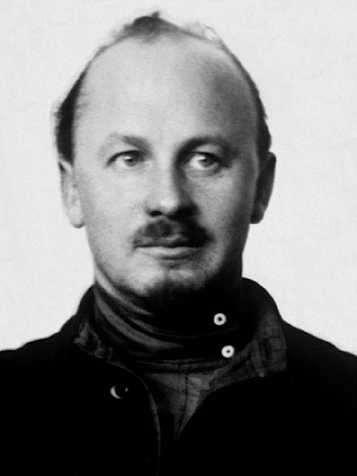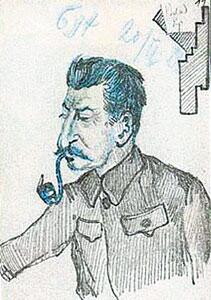On 15 March 1938, Nikolai Bukharin, one of the leading members of the post-Russian Revolution politburo, was executed.
 Born in Moscow on 9 October 1888 to two primary school teachers, the 17-year-old Bukharin joined the workers’ cause during the Russian Revolution of 1905 and, the following year, became a member of the Bolshevik Party. Like many of his radical colleagues, he was arrested at regular intervals to the point that, in 1910, he fled into exile.
Born in Moscow on 9 October 1888 to two primary school teachers, the 17-year-old Bukharin joined the workers’ cause during the Russian Revolution of 1905 and, the following year, became a member of the Bolshevik Party. Like many of his radical colleagues, he was arrested at regular intervals to the point that, in 1910, he fled into exile.
At various times he lived in Vienna, Zurich, London, Stockholm, Copenhagen and Krakow, the latter where he met Bolshevik leader, Vladimir Lenin, and began working for the party newspaper, Pravda, ‘Truth’. In 1916, he moved to New York where he met up with another leading revolutionary, Leon Trotsky.
‘Favourite of the whole party’
Following the February Revolution of 1917 and the overthrow of the tsar, Nicholas II, Bukharin returned to Moscow and was elected to the party’s central committee. Bukharin clashed with Lenin on the latter’s decision to surrender to Germany, thus ending Russia’s involvement in the First World War, believing that the Bolsheviks could transform the conflict into a pan-European communist revolution. Lenin got his way, and the Treaty of Brest-Litovsky was duly signed in March 1918.
Bukharin was a thinker and produced several theoretical tracts, works that didn’t always meet with Lenin’s full approval. In Lenin’s Testament, in which he passed judgement on various members of his Central Committee, Lenin wrote that Bukharin was ‘rightly considered the favourite of the whole Party,’ but ‘his theoretical views can be classified as fully Marxist only with the great reserve, for there is something scholastic about him.’ (Lenin’s Testament was particularly damning of Joseph Stalin but, following Lenin’s death on 21 January 1924, was quietly suppressed).
‘Not a man, but a devil’
In 1924, Bukharin was appointed a full member of the Politburo. It was here, during the immediate post-Lenin years, that Bukharin became an unwitting pawn in Stalin’s deadly power games. Bukharin had opposed collectivization and believed agriculture was best served by encouraging the richer peasants, the kulaks, to produce more. In this he was supported by Stalin – but only in order for Stalin to marginalise then remove those he saw as threats, men such as Trotsky, Lev Kamenev and Grigory Zinoviev. Kamenev and Zinoviev soon caved in to Stalin. Trotsky, who did not, was exiled, first within the Soviet Union, then to Turkey and ultimately to Mexico where, in August 1940, he was killed by a Stalinist agent. Having defeated his opponents, Stalin then took their ideas and advocated rapid collectivization and the liquidation of the kulaks, criticizing Bukharin for holding opposite views.
Bukharin realised what Stalin was doing: ‘He [Stalin] is an unprincipled intriguer who subordinates everything to his appetite for power. At any given moment he will change his theories in order to get rid of someone.’
During a visit to Paris in February 1936, where, on Stalin’s orders, he was retrieving the archives of Marx and Engels, Bukharin visited an exiled Menshevik and there, momentarily free from the all-seeing eyes of the Soviet state, talked of his boss: ‘If anyone can talk better than him, that person is doomed, Stalin won’t let him live. Stalin is a little evil man; no, not a man, but a devil.’
Downfall

Meanwhile, Bukharin’s old comrades, Kamenev and Zinoviev, were put on show trial, accused of ludicrous crimes, and, in 1936, executed. Bukharin was not sorry, crowing that he was ‘glad’ they had been shot like ‘dogs’. It would not be long until it was his turn.
(Bukharin was a competent cartoonist and pictured is a cartoon he did of the man that would one day order his execution).
‘It is impossible to live’
In February 1937, the arrest duly came. He responded by going on hunger strike. Stalin criticized him: ‘How dare you give us an ultimatum. Who are you to challenge the Central Committee?’ Bukharin responded, ‘With such accusations hanging over me, it is impossible to live’, to which Stalin accused him of blackmail.
During his year of incarceration, awaiting trial within the feared walls of Lubyanka Prison in Moscow, Bukharin wrote. And he wrote a lot – some 1,400 pages, including 200 poems and even a novel, How It All Began. Remarkable – given his circumstances, not just of imprisonment but knowing his life would soon end by an executioner’s bullet. The novel, a semi-autobiographical work, known in Russia as ‘the prison novel’, was left unfinished; indeed it ends mid-sentence.
Bukharin was accused, amongst many obviously false accusations, of planning to assassinate Stalin and of being a Trotskyite. (Soon, the word ‘Bukharinite’ came into common usage. To be labelled as such was almost as damning as being labelled a Trotskyite).
Bukharin only confessed when his interrogators used a favourite tack and threatened to bring in his wife and family. Later, however, he retracted his confession. Ultimately, his confession, or lack of it, was immaterial – the result was a foregone conclusion. ‘The monstrousness of my crime is immeasurable,’ he said on the final day of his trial; ‘Everybody perceives the wise leadership of the country that is ensured by Stalin.’ The state prosecutor assigned to preside over his trial, Andrey Vyshinsky, dismissed Bukharin as a ‘hybrid: half fox, half pig’.
Bukharin had married three times. All three wives ended up in a gulag. He married his third wife, Anna Larina, in January 1934, and as newly-weds they lived for a while in the Kremlin apartment where Nadezhda Alliluyeva, Stalin’s second wife, had committed suicide in November 1932.
Anna Larina’s Great Ordeal
Soon after his arrest, Bukharin wrote a letter to Anna, in which he warned: ‘A great ordeal awaits you. I beg you, my dearest, muster all your strength, tighten all the strings of your heart, but don’t allow them to break.’ But Anna herself had been arrested. She received the letter fifty-four years later, in 1992. One can only imagine the impact – reading a desperate letter written over a half a century before.
Following Bukharin’s arrest, Anna Larina spent 18 months in a cell, ankle-deep in water, during which time she learned from another prisoner, via the tapping on her cell wall, that her husband had been executed. She served a further eighteen years in a gulag and was only released in 1959. She spent years trying to clear Bukharin’s name which, in 1988, fifty years after his execution, she finally managed to achieve. She wrote This I Cannot Forget, published 1993, about Bukharin and their life together. She died in 1996 – five years after the collapse of the Soviet Union.
Letters of a condemned man
While in prison awaiting his fate, Nikolai Bukharin wrote thirty-four desperate letters to Stalin. Not one was answered. In one he promises that if released he would ‘wage a mortal war against Trotsky’, even offering up his wife as a hostage for six months as an ‘added insurance’. In another letter, he asks of Stalin, ‘Koba, why do you need me to die?’ (‘Koba’ being a revolutionary nickname used by Stalin in his younger days. The letter was found hidden in Stalin’s desk following his death 15 years later.)
In his last letter to Stalin, Bukharin writes pathetically, ‘[I] have learned to cherish and love you wisely.’ He begs Stalin to allow him to die by poison not by a bullet: ‘I implore you beforehand, I entreat you … let me have a cup of morphine.’ Not only did Stalin ignore this request, but Bukharin was forced to sit and watch as others were shot before him.
In the same letter, Bukharin maintains his innocence, writing, ‘My heart boils over when I think that you might believe that I am guilty of these crimes … Standing on the edge of a precipice, from which there is no return, I tell you on my word of honour, as I await my death, that I am innocent of those crimes to which I admitted.’
It did him little good – Nikolai Bukharin was executed 15 March 1938, aged 49, a victim of the system he helped create.
Rupert Colley.
 Read more Soviet / Russian history in The Clever Teens’ Guide to the Russian Revolution (80 pages) available as paperback and ebook from Amazon, Barnes & Noble, Waterstone’s, Apple Books and other stores.
Read more Soviet / Russian history in The Clever Teens’ Guide to the Russian Revolution (80 pages) available as paperback and ebook from Amazon, Barnes & Noble, Waterstone’s, Apple Books and other stores.